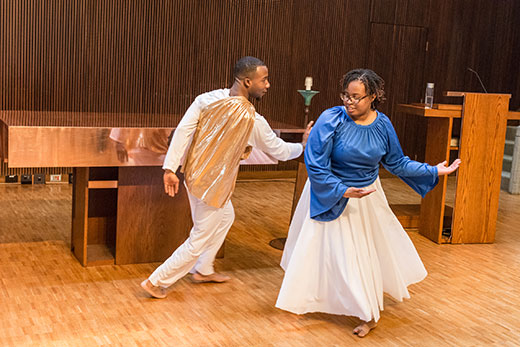Countless inspirational quotes tell us that real change only happens outside of our perceived comfort zones. When Candler School of Theology student Keith Alexander Asberry II was in Sri Lanka on a travel seminar, he says he received a similar message from God: “Never forsake your calling for comfortability.”
For Asberry, who is graduating with a master of theological studies degree and certificates in religious education and Black Church Studies, graduate theological education has provided multiple ways to push through discomfort and deepen his calling of bringing together “all God’s people, regardless of race, class, ethnicity, gender, linguistic barriers or whatever constructs we may use in divisive ways.”
Asberry arrived at Candler with an extensive background in dance and its use in worship, so he embraced his role as a student worker in the Office of Worship. The challenge came when Khalia Williams, assistant dean of worship and music and assistant professor in the practice of worship, charged Asberry with formally organizing and leading the Candler Liturgical Dancers.
“I didn’t see myself as a leader, but Dean Williams provided the space and opportunity for me to develop in spite of my initial hesitancy and push back,” says Asberry, who led rehearsals and developed choreography for the group. “It helped me to think about myself and my calling differently.”
Worship as an art form
While Asberry originally doubted his ability to lead, he never doubted the importance of art in worship.
“I believe that all arts are a part of my calling,” he says. “Art transcends linguistic and social boundaries to bring people together and encounter God. Dance, particularly, is a part of my calling because it requires one to bring their full selves – the entire physical body – into the artistic process. The body is such an important piece of worship that we often overlook. Dance becomes a tool for us to present our bodies to God as an offering, for God’s glory to be shared and revealed on earth.”
Asberry, who says that providing space for other choreographers to find their voice within the group was a highlight of his work, led the Candler Liturgical Dancers in addition to other duties preparing for services.
“Keith leads the planning and execution for several Candler worship services with great thoughtfulness and care,” Williams says. “He has a proven passion for integrating theology, the arts and social justice that shapes and reveals insight of the Black religious experience. His contributions to the Office of Worship have been invaluable, and his ebullient personality and affable nature have made him an ideal person with whom to collaborate.”
As for Asberry, he says that his experience as a worship planner has given him a deeper appreciation for worship as an art form.
“While I have been involved in the incorporation of arts into the worship service, I realize there is an art to worship itself,” he says. “The art of worship is a sensitivity to the direction of Holy Spirit, and I can say from the moments of leading or planning that I have learned to trust Holy Spirit and myself more.”
Connecting social experiences with the spiritual world
Asberry found moments to both push and trust himself in the classroom as well. A philosophy major at Morehouse College, he says he wanted to attend Candler so he could gain a deeper understanding of the intersections of human social experiences with the spiritual world.
While his courses “helped me to look and think differently about the world around me and the various intersecting systems that shape our lives,” Asberry says it was the deep conversations with Candler’s faculty members that provided the most significant impact. “They helped me to understand myself and my future in ways that I often feared and would shy away from” prior to attending, he says.
Asberry’s trip to Sri Lanka provided another opportunity to trust God outside of his comfort zone. It was his first time traveling internationally, and he found himself inspired by the work of building community despite barriers such as language or geography.
“In Sri Lanka, I had the opportunity to witness God’s spirit move beyond the border of my own comfortability and the borders I thought would be a challenge to overcome,” Asberry says. “I had the opportunity to preach in a Sri Lankan church that only spoke Tamil and required me working with a translator. I made a conscious decision not just to trust God, but to allow myself to go through the process He had for me in this new context. Having done so, I found countless opportunities being placed before me, and with each one, I received even more understanding of the call God has for me.”
Like many graduates this year, Asberry is facing uncertainty about his immediate next steps given the COVID-19 pandemic, but he is not losing sight of his long-term goals.
“One thing that I plan on doing is building,” he says. “At Candler, I have built a foundation to see the intersections of the arts, religion and culture. I hope to one day build on that foundation with my own school of music and dance.”
Asberry envisions a school of the arts connected with theological teaching, in which the arts are used as a “way of connecting with God, exploring and making sense of the world around us and presenting God to others in a language that can transcend our divides.
“I hope people from all over the world could come together and experience God through the presentation of the arts.”

